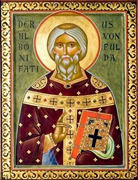 … Centuries later, what message can we gather today from the teaching and marvelous activity of this great missionary and martyr? For those who approach Boniface, an initial fact stands out: the centrality of the word of God, lived and interpreted in the faith of the Church, a word that he lived, preached and witnessed to until he gave the supreme gift of himself in martyrdom. He was so passionate about the word of God that he felt the urgent need and duty to communicate it to others, even at his own personal risk. This word was the pillar of the faith which he had committed himself to spreading at the moment of his episcopal ordination: “I profess integrally the purity of the holy Catholic faith and with the help of God I desire to remain in the unity of this faith, in which there is no doubt that the salvation of Christians lies” (Epist. 12, in S. Bonifatii Epistolae, ed. cit., p. 29).
… Centuries later, what message can we gather today from the teaching and marvelous activity of this great missionary and martyr? For those who approach Boniface, an initial fact stands out: the centrality of the word of God, lived and interpreted in the faith of the Church, a word that he lived, preached and witnessed to until he gave the supreme gift of himself in martyrdom. He was so passionate about the word of God that he felt the urgent need and duty to communicate it to others, even at his own personal risk. This word was the pillar of the faith which he had committed himself to spreading at the moment of his episcopal ordination: “I profess integrally the purity of the holy Catholic faith and with the help of God I desire to remain in the unity of this faith, in which there is no doubt that the salvation of Christians lies” (Epist. 12, in S. Bonifatii Epistolae, ed. cit., p. 29).
The second most important proof that emerges from the life of Boniface is his faithful communion with the Apostolic See, which was a firm and central reference point of his missionary work; he always preserved this communion as a rule of his mission and left it, as it were, as his will. In a letter to Pope Zachary, he said: “I never cease to invite and to submit to obedience to the Apostolic See those who desire to remain in the Catholic faith and in the unity of the Roman Church and all those whom God grants to me as listeners and disciples in my mission” (Epist. 50: in ibid., p. 81). One result of this commitment was the steadfast spirit of cohesion around the Successor of Peter which Boniface transmitted to the Church in his mission territory, uniting England, Germany and France with Rome and thereby effectively contributing to planting those Christian roots of Europe which were to produce abundant fruit in the centuries to come.
Boniface also deserves our attention for a third characteristic: he encouraged the encounter between the Christian-Roman culture and the Germanic culture. Indeed, he knew that humanizing and evangelizing culture was an integral part of his mission as Bishop. In passing on the ancient patrimony of Christian values, he grafted on to the Germanic populations a new, more human lifestyle, thanks to which the inalienable rights of the person were more widely respected. As a true son of St Benedict, he was able to combine prayer and labour (manual and intellectual), pen and plough.
Boniface’s courageous witness is an invitation to us all to welcome God’s word into our lives as an essential reference point, to love the Church passionately, to feel co-responsible for her future, to seek her unity around the Successor of Peter. At the same time, he reminds us that Christianity, by encouraging the dissemination of culture, furthers human progress. It is now up to us to be equal to such a prestigious patrimony and to make it fructify for the benefit of the generations to come.
His ardent zeal for the Gospel never fails to impress me. At the age of 41 he left a beautiful and fruitful monastic life, the life of a monk and teacher, in order to proclaim the Gospel to the simple, to barbarians; once again, at the age of 80, he went to a region in which he foresaw his martyrdom.
By comparing his ardent faith, this zeal for the Gospel, with our own often lukewarm and bureaucratized faith, we see what we must do and how to renew our faith, in order to give the precious pearl of the Gospel as a gift to our time.
Pope Benedict XVI
General Audience, Wednesday, 11 March 2009
